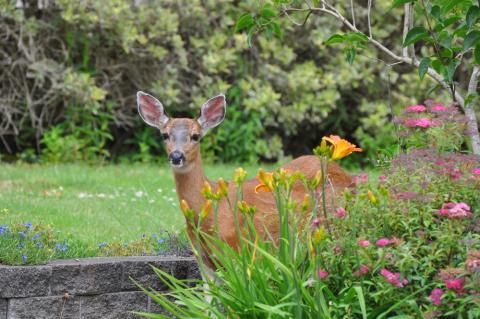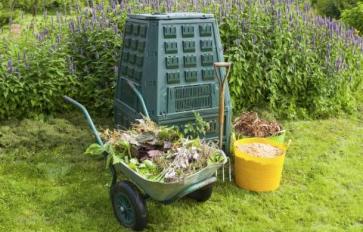
After living in San Diego for several years, my husband and I moved to a small town in the Pacific Northwest where our closest neighbors are raccoons, owls, and, most abundantly, deer. We see them at all times of the day: in the morning from our bedroom window, in the afternoon grazing in the woods in front of our house, and at night, when I catch them taking nibbles from my garden. That is, until I realized I could create a deer-resistant garden that left nature safe and my garden intact.
Deer are herbivores that eat a wide range of plant food—grasses, twigs, berries, fruit, shoots, and, perhaps, vegetables or flowers in your garden beds. With the expansion of urban development, and the forced removal of nature predators, like bear or cougar, deer have moved into our neighborhoods more than we might like.
If you live in a nature-rich area, hopefully there is enough food to go around for the deer without having to sacrifice your garden. Still, it’s often necessary to provide a gentle reminder to stay away from the hydrangea.
Deer-Repellants Are Potent But Work
For some, the easy solution might be to purchase one of the many deer repellants available at garden and home stores. While many of these are not toxic, they are typically based on strong smells, meaning that they are not suitable for vegetable gardens.
Many commercial brands you find will not wash off easily. Homemade recipes, on the other hand, will need to be reapplied often but may feel safer to use since most require ingredients in your pantry like cayenne pepper, eggs, and garlic. That said: they won’t smell pleasant for deer or humans, so be mindful of where you spray.
Fence Your Vegetable Garden
The best way to deter deer from your fruit or vegetable garden is often the least attractive: fencing. If you have the ability to fence your garden, you have a guaranteed answer to your problem. That said, deer can jump over six feet, so most gardeners will recommend a fence height over 7.5 feet. Alternatively, a six-foot fence that is slanted can also prevent deer from jumping into the yard.
If fencing isn’t possible, netting can do the trick. Find a size suitable for your plant or garden and cover accordingly.
Deer-Resistant Flowers, Shrubs & Trees
Within ten hours of planting a hydrangea bush in my front yard, all of its bright pink buds were gone. My bugleweed, however, was untouched.
The easiest way to deter deer from the garden is to grow deer-resistant plants. These include poisonous plants, plants that have strong fragrances, and a selected variety like bleeding heart, bluebells, and lamb’s ear. Many ground covers and ornamental grasses are also deer resistant.
Other good options include:
- forget-me-not
- heather
- sage (many varieties)
- larkspur
- lavender
- black-eyed Susan
- meadow rue
- mint
- rosemary
- snapdragon
- strawflower
- thyme
- bee balm
- California poppy
- lilac
- juniper
- hazelnut
Deer are more likely to be heavy browsers when food is scarcer—from October to February—so keep in mind that plants may be most damaged then.
Plants That Deer Love
On the other hand, deer are keen to eat firs and even the invasive English ivy. Most importantly, deer love hostas, roses, and day lilies so be sure to keep these well fenced or refrain from planting them in your garden.
Other deer favorites include:
- azaleas
- pansies
- tulips
- hydrangea
- holly
- rhododendron
- yew
- fruit trees, including apple
Have deer been a nuisance in your garden? What have you done to deter deer from your yard? Let us know in the comments below!








